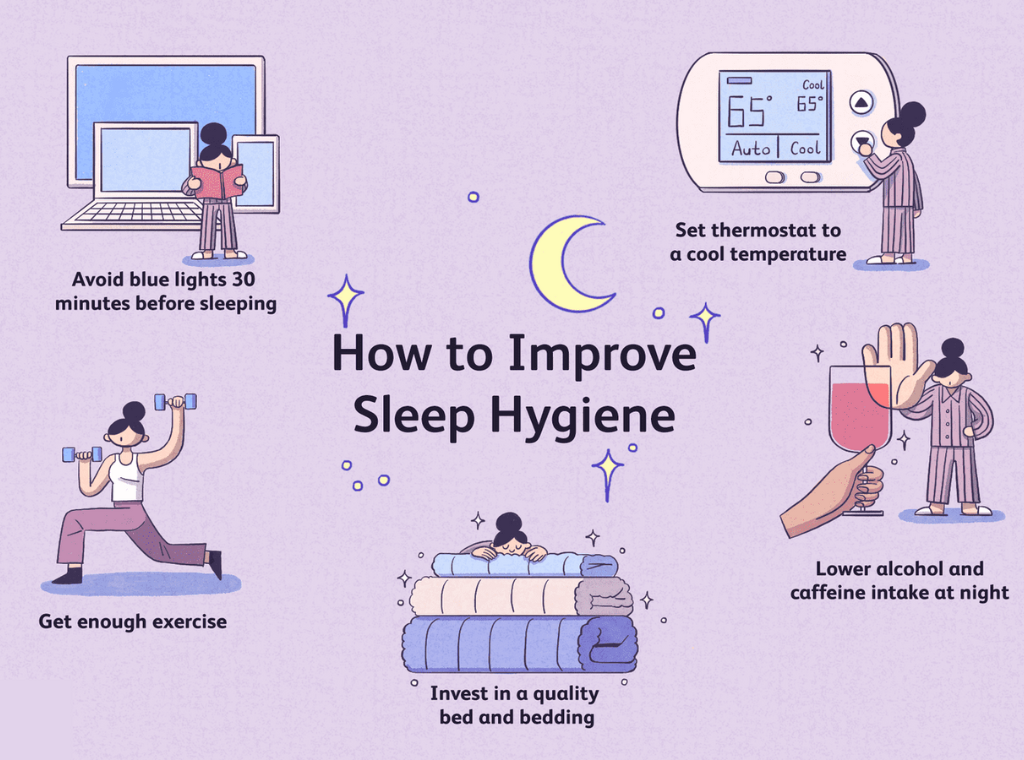Ramesh, a 34-year-old software engineer in Pune, had it all figured out — stable job, happy family, weekend cricket matches with friends. But for months, he’d been waking up with brain fog and constant fatigue. He blamed work stress, age, and even the mattress. What he didn’t realise was that his:
❌ 2-hour Instagram scroll before bed ,
❌ late-night chai, and irregular sleep schedule were sabotaging his energy.
Only when he stumbled across the term “Sleep Hygiene” during a The Life TrackR newsletter did the pieces fall into place.
Why You Need a New Way of Thinking About Sleep
Most of us treat sleep as a backup task — something we’ll “do later.” But here’s a mindset shift: Sleep isn’t the end of your day. It’s the foundation of your next one.
Think about it:
- You prep for meetings, workouts, and holidays. But do you prep for sleep?
- You set alarms to wake up, but do you set reminders to wind down?
Good sleep doesn’t happen by accident. It needs intentional habits — a clean sleep environment, a consistent schedule, and calming routines. That’s what Sleep Hygiene is all about.
So, What is Sleep Hygiene?
Sleep Hygiene refers to the habits and practices that are necessary to have a good quality nighttime sleep and full daytime alertness. It’s not about perfection — it’s about consistency, clarity, and calmness.
It includes:
- When you go to bed and wake up
- What you do before sleeping
- Your sleep environment (light, temperature, noise)
- Your food and screen habits in the evening
Mastering Sleep Hygiene: Simple Steps for Better Rest
Getting good sleep isn’t just about going to bed on time — it’s about preparing your body and mind with the right habits and a calming environment. Here’s a realistic guide to sleep hygiene, designed for Indian lifestyles:
1. Stick to a Sleep Schedule
Your body runs on a natural clock. Sleeping and waking at the same time daily improves rest quality. Try 10:30 PM – 6:30 AM, even on weekends.
2. Meditate Before Bed
Mental clutter delays sleep. A 10-minute meditation or breathing session can calm your system. Use apps like Headspace or ThinkRight.me.
3. Build a Calming Routine
Cue your brain for sleep with a 30-minute routine — warm water, light reading, skincare, or journaling. Avoid stimulating activities.
4. Turn Off Screens 1 Hour Before
Blue light delays melatonin release. Shut off devices at least an hour before bed. Try music or physical books instead.
5. Eat Light at Night
Heavy or spicy meals close to bedtime cause indigestion. Finish dinner 2 hours before sleep — stick to light options like dal-rice or khichdi.
6. Move More During the Day
Exercise improves sleep. Aim for 30 minutes of movement — yoga, walking, or dancing. Skip intense workouts after 8 PM.
7. Make Your Room Dark and Cool
Darkness supports melatonin production. Use blackout curtains, eye masks, and maintain a cool room temperature (22–25°C).
8. Avoid Caffeine After 3 PM
Tea, coffee, and sodas contain caffeine that stays in your system for hours. Opt for chamomile or Tulsi tea instead.
Small changes, big results. By practicing sleep hygiene, you’re not just improving sleep — you’re investing in better energy, focus, and mood every day.
Conclusion
Sleep Hygiene is not a luxury — it’s a survival skill for modern life. In our fast-paced Indian routines, where career and family compete for our attention, prioritising healthy sleep habits can be the edge we’ve been missing. A few intentional changes can lead to deeper sleep, higher energy, sharper focus, and better moods — every single day.
FAQs
1. What is the best time to sleep in India?
Ideally between 10:00 PM to 11:00 PM, aligning with natural melatonin production.
2. How much sleep do working adults in India need?
Most need 7 to 8 hours, but quality matters more than quantity.
3. Is it okay to use my phone before bed?
Not recommended. Blue light affects melatonin. Try to stop screen use 30 minutes before bed.
4. Can I sleep late and wake up late instead?
It’s better to sync with your natural circadian rhythm — early to bed, early to rise is still ideal.
5. What should I avoid eating before bed?
Avoid spicy food, heavy curries, caffeine, and sugar-laden desserts late at night.
6. Are afternoon naps good or bad?
Short naps (15–20 mins) before 3 PM can be refreshing. Long or late naps can harm night sleep.
7. Is meditation helpful for sleep?
Yes! Even 5 minutes of deep breathing or guided meditation can calm your nervous system.
8. What is the biggest sleep hygiene mistake Indians make?
Irregular sleep schedules and late-night screen usage are two of the most common mistakes.
#SleepHygiene #BetterSleep #HealthyHabits #LifeTrackR #IndianLifestyle #SelfCare #WellnessIndia #SleepTips #ProductivityIndia
Editor’s Note: This article was originally published here https://thelifetrackr.com/what-is-sleep-hygiene-and-how-to-maintain-it/ by @Kairav and @krutika
